| Listing 1 - 9 of 9 |
Sort by
|
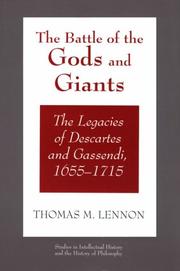
ISBN: 0691074003 1306985161 9780691074009 Year: 1993 Volume: *1 Publisher: Princeton (N.J.) : Princeton university press,
Abstract | Keywords | Export | Availability | Bookmark
 Loading...
Loading...Choose an application
- Reference Manager
- EndNote
- RefWorks (Direct export to RefWorks)
Descartes, René --- Gassendi, Pierre --- Locke, John --- Gassendi, Petrus --- Gassendus, Petrus --- Descartes, Renatus --- Cartesius, Renatus --- Gassendi, Pierre, --- Descartes, René, --- Locke, John, --- Philosophy, Modern --- Philosophy, French --- Philosophie moderne --- Philosophie française --- Descartes, René, --- Influence --- Influence. --- Gassendus, Petrus, --- Petrus Gassendus, --- Gassend, Pierre, --- Philanthropus, --- Lokk, Dzhon, --- Lūk, Jūn, --- Lo-kʻo, --- Locke, Giovanni, --- Lock, --- Lock, John, --- Rokku, Jon, --- לוק, י׳ון, --- Gassendi, Pierre, - 1592-1655. --- Descartes, René, - 1596-1650. --- Locke, John, - 1632-1704.
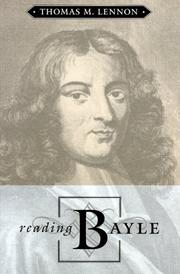
ISBN: 1282037323 9786612037320 1442679018 9781442679016 0802044883 0802082661 9780802044884 9780802082664 Year: 1999 Publisher: Toronto, [Ontario] ; Buffalo, [New York] ; London, [England] : University of Toronto Press,
Abstract | Keywords | Export | Availability | Bookmark
 Loading...
Loading...Choose an application
- Reference Manager
- EndNote
- RefWorks (Direct export to RefWorks)
Pierre Bayle (1647-1706) is a key intellectual figure of the period, and his Historical and Critical Dictionary is the philosophy best seller of all time. This work is a critical but sympathetic treatment of a neglected thinker of interest in the fields of the history of modern philosophy, the history of ideas, and 17th century French culture.
PHILOSOPHY / Criticism. --- Bayle, Pierre, --- Bayle, Pierre --- Bayle, Peter, --- Beĭlʹ, Pʹer, --- Bayle, --- C. L. A. A. P. D. P.,
Book
ISBN: 1282400231 9786612400230 9047424468 9789047424468 9789004171152 9004171150 Year: 2008 Publisher: Leiden ; Boston : Brill,
Abstract | Keywords | Export | Availability | Bookmark
 Loading...
Loading...Choose an application
- Reference Manager
- EndNote
- RefWorks (Direct export to RefWorks)
The skeptic Pierre-Daniel Huet’s Censura philosophiae cartesianae (1689) is the most comprehensive, unrelenting and devastating critique of Descartes ever. It incisively captures all the issues that now interest readers of Descartes: the method of doubt, the cogito , clarity and distinctness as criteria of truth, the circularity of the Meditations , proofs of God’s existence, et cetera Naturally, the work provoked great controversy among the Cartesians, who were implicated in various capacities—Nicolas Malebranche as the occasional cause of the publication, and Pierre-Sylvain Regis as the chief defender of the Cartesian camp. What emerges in this study of the controversy is a heroic, defensible Descartes. He possesses hitherto unappreciated answers to the criticisms that have bedeviled his philosophy from his time to ours.
Skeptizismus --- Skepticism. --- Scepticism --- Unbelief --- Agnosticism --- Belief and doubt --- Free thought --- Descartes, René --- Huet, Pierre Daniel --- Descartes, René, --- Descartes, Renatus --- Cartesius, Renatus --- Skepticism --- Descartes, René --- Huet, Daniel --- Huetius, Petrus Danielis --- Huet, Pierre-Daniel, --- Descartes, Rene,
Book
ISBN: 9781400863396 1400863392 0691604908 Year: 2014 Publisher: Princeton, NJ
Abstract | Keywords | Export | Availability | Bookmark
 Loading...
Loading...Choose an application
- Reference Manager
- EndNote
- RefWorks (Direct export to RefWorks)
By the mid-1600s, the commonsense, manifest picture of the world associated with Aristotle had been undermined by skeptical arguments on the one hand and by the rise of the New Science on the other. What would be the scientific image to succeed the Aristotelian model? Thomas Lennon argues here that the contest between the supporters of Descartes and the supporters of Gassendi to decide this issue was the most important philosophical debate of the latter half of the seventeenth century. Descartes and Gassendi inspired their followers with radically opposed perspectives on space, the objects in it, and how these objects are known. Lennon maintains that differing concepts on these matters implied significant moral and political differences: the Descartes/Gassendi conflict was typical of Plato's perennial battle of the gods (friends of forms) and giants (materialists), and the crux of that enduring philosophical struggle is the exercise of moral and political authority.Lennon demonstrates, in addition, that John Locke should be read as having taken up Gassendi's cause against Descartes. In Lennon's reinterpretation of the history of philosophy between the death dates of Gassendi and Malebranche, Locke's acknowledged opposition to Descartes on some issues is applied to the most important questions of Locke exegesis.Originally published in 1993.The Princeton Legacy Library uses the latest print-on-demand technology to again make available previously out-of-print books from the distinguished backlist of Princeton University Press. These editions preserve the original texts of these important books while presenting them in durable paperback and hardcover editions. The goal of the Princeton Legacy Library is to vastly increase access to the rich scholarly heritage found in the thousands of books published by Princeton University Press since its founding in 1905.
Book
ISBN: 900440449X 9004400966 Year: 2019 Publisher: Leiden Boston : BRILL,
Abstract | Keywords | Export | Availability | Bookmark
 Loading...
Loading...Choose an application
- Reference Manager
- EndNote
- RefWorks (Direct export to RefWorks)
How much of our own self- interest should we be willing to sacrifice for love of another? The Quietists answered, all of it, even the salvation of our own soul. Opposing them were the Jansenists, including Arnauld, who saw self-interest as inescapable. The debate swept across French society in the 17th century, with Bossuet and Fénelon on opposite sides, and was multi- dimensional, with political and ecclesiastical intrigue, charges of heresy, and many shenanigans. Initially theological, the debate’s basis lay in differing philosophical concepts of freewill, with both sides claiming support from Descartes’s views. The debate thus highlights interpretation of the Cartesians, especially Malebranche, a prominent participant in it. Nevertheless, this is the first book on the debate in English.
Sacrifice. --- Self-interest. --- Quietism. --- Jansenists. --- Descartes, René,
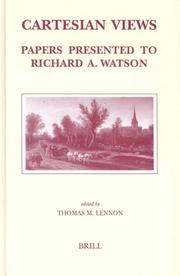
ISBN: 9004132996 9786610465088 1423714172 1280465085 9047402650 9781423714170 9789047402657 9789004132993 9789004132993 9781280465086 6610465088 Year: 2003 Publisher: Leiden ; Boston : Brill,
Abstract | Keywords | Export | Availability | Bookmark
 Loading...
Loading...Choose an application
- Reference Manager
- EndNote
- RefWorks (Direct export to RefWorks)
Many kinds of Cartesian views are treated by these papers: the views that Descartes held, views from our perspective on those views, views on Descartes held by his early critics and followers, and views that are Cartesian in outlook (not for nothing is Descartes still regarded as the father of modern philosophy.) These overlapping views provide the unity of this volume, and reflect the unity of Richard A.Watson’s philosophical work. Not least among Watson’s contributions has been his depiction of Cartesianism as a response to a set of problems within Descartes’s philosophy. The later Cartesians were not slavish followers of Descartes. The contributors to this volume might be viewed as standing to Watson as the Cartesians did to Descartes. Contributors include: Jean-Robert Armogathe, Leslie Armour, Alan Gabbey, Daniel Garber, William H. Gass, Alan Hausman, David Hausman, Thomas M. Lennon, José R. Maia Neto, Steven Nadler, Richard H. Popkin, Han van Ruler, Theo Verbeek, Fred Wilson, and Alison Wylie.
Descartes, René, --- Descartes, Renatus --- Cartesius, Renatus --- Descartes, Rene,
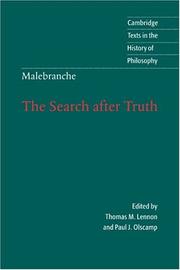
ISBN: 0521589959 9780521589956 Year: 1997 Publisher: Cambridge Cambridge University press
Abstract | Keywords | Export | Availability | Bookmark
 Loading...
Loading...Choose an application
- Reference Manager
- EndNote
- RefWorks (Direct export to RefWorks)
Knowledge, Theory of --- Epistemology --- Theory of knowledge --- Philosophy --- Psychology --- Knowledge, Theory of.
Book
ISBN: 9004305920 9789004305922 9004305912 9789004305915 9789004305915 9004305912 Year: 2015 Publisher: Leiden ; Boston : Brill,
Abstract | Keywords | Export | Availability | Bookmark
 Loading...
Loading...Choose an application
- Reference Manager
- EndNote
- RefWorks (Direct export to RefWorks)
The Battle of Gods and Giants Redux is a collection of 14 original essays by leading scholars in the field. Part One includes figures and topics associated with Descartes, the chief idealist in the story, including Leibniz, Spinoza, and Malebranche; Part Two includes figures and topics that fall on the Gassendist materialist side of the battle, including Hobbes, Bayle, and Locke. In organizing these varied discussions along these themes and lines, something more than the sum of the parts emerges. The reader will gain a breadth and depth of insight into the battle of ideas in early modern thought-historical, philosophical, and interpretive. Contributors are: Margaret Atherton, Martha Brandt Bolten, Patricia Easton, Lorne Falkenstein, Nicolas Jolley, José Maia Neto, Steven Nadler, Alan Nelson, Lawrence Nolan, Donald Rutherford, Tad Schmultz, Kurt Smith, Julie Walsh, and Richard Watson.
Philosophy, Modern --- Descartes, René, --- Descartes, Renatus --- Cartesius, Renatus --- Philosophy, Modern. --- 1600 - 1699 --- Modern philosophy --- Cartes, Renate des, --- Cartesio, --- Cartesius, Renatus, --- Dekart, René, --- Dekaruto, --- Des Cartes, --- Des Cartes, Renate, --- Des-Cartes, Renati, --- Des Cartes, René, --- Descartes, Renatus, --- Dikaer, --- Dikaer, Lenai, --- Dīkārt, --- Dīkārtīyah, --- Kartezjusz,
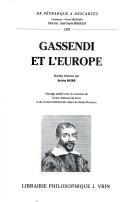

ISBN: 2345001283 2711613062 Year: 2021 Publisher: Paris : Vrin,
Abstract | Keywords | Export | Availability | Bookmark
 Loading...
Loading...Choose an application
- Reference Manager
- EndNote
- RefWorks (Direct export to RefWorks)
Difficile à lire, connu de réputation pour ses objections aux Méditations de Descartes, sa réhabilitation d’Épicure et des atomes, voire le caractère ambigu de ses relations avec les “libertins”, Pierre Gassendi est un personnage un peu flou dans notre galerie de portraits imaginaire. Il fut cependant un auteur important, lu, connu, approuvé ou critiqué dans toute l’Europe, surtout par les savants qui voulaient fonder efficacement leur physique moderne sans renier pour autant les acquis des anciens. Les études réunies ici ont cherché comme la trace et le reflet de l’œuvre de Gassendi dans les écrits d’autres auteurs qui ont vécu de son temps et jusqu’à la fin des Lumières – non seulement en France –, mais aussi en Angleterre (comme Walter Charleton, John Locke, David Hume ou Robert Boyle), en Hollande (professeurs d’Université), en Allemagne (Leibniz), en Pologne (Sociniens et “libertins”), en Italie du Nord (comme le jésuite milanais Thommaso Ceva), en Italie du Sud (comme le fondateur de l’Accademia degli Investiganti Tommaso Cornelio ou Giambattista Vico), en Espagne enfin (comme le médecin Martínez). Aujourd’hui encore Gassendi fait des adeptes parmi ceux que séduisent les chemins non battus de l’effort gratuit et de l’érudition austère, ceux que ravit absolument une certaine esthétique baroque de l’esprit pur.
History & Philosophy Of Science --- Medieval & Renaissance Studies --- Renaissance --- philosophie
| Listing 1 - 9 of 9 |
Sort by
|

 Search
Search Feedback
Feedback About UniCat
About UniCat  Help
Help News
News